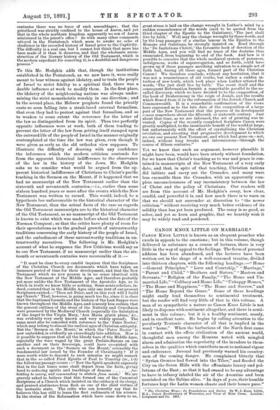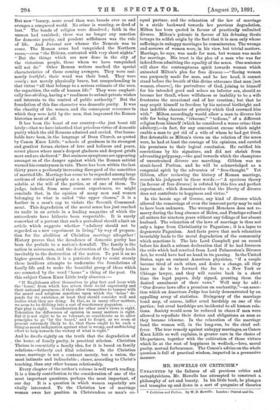CANON KNOX LITTLE ON MARRIA.GE.*
CANON KNOX LITTLE is known as an eloquent preacher who excels in appeals to the emotions ; but in this volume, though delivered in substance as a course of lectures, there is very little in the way of appeal to the feelings. The form of personal address has been abandoned, and the lectures have been written out in the shape of a well-reasoned treatise, divided into thirteen chapters, with the following headings :—" Home —General Principles," " Love and Courtship," "Marriage," "Parent and Child," "Brothers and Sisters," "Masters and Servants," " Religion of the Family," "The Home and Un- married Life," " Celibacy and Home Life," "Unhappy Homes," " The Home and Happiness," " The Home and Sorrow," and " The Home Beyond the Grave." Some of these headings might easily lend themselves to sentimental treatment, but the reader will find very little of that in this volume. A man of so sympathetic a nature as Canon Knox Little is not likely to dispense with sentiment altogether, and there is senti- ment in this volume ; but it is a healthy sentiment, manly, and in excellent taste. He begins by calling attention to the peculiarly Teutonic character of all that is implied in the word " home." When the barbarians of the North first came in contact with the effete civilisation of the ancient world, thoughtful men among the Romans noted with mingled alarm and admiration the superiority of the invaders to them- selves in the qualities which contribute most to national vigour and endurance. Juvenal had previously warned his country- men of the coming danger. He complained bitterly that " Syrian Orontes had flowed into the Tiber," and flooded the City on the Seven Hills with the effeminate luxury and pol- lutions of the East ; so that it had ceased to be any advantage to have in infancy inhaled the air of the Aventine and been nourished on the Sabine olive. " In days of yore, their humble fortunes kept the Latin women chaste and their homes pure."
• The Christian Home : its Foundations and Duties. By W. J. Knox Little, M.A., Canon Residentiary of Worcester, and Vicar of Hoar Cross. London: Longman and Co. 1891.
But now "luxury, more cruel than war, broods over us and avenges a conquered world. No crime is wanting, or deed of last." The bonds of religion were dissolved ; faith in the unseen had vanished ; there was no longer any sanction for domestic purity, and prudent selfishness was the rule of life. And Juvenal saw whence the Nemesis was to come. The Roman arms had vanquished the Northern races,—even " the Britons, contented with very short nights." " But the things which are now done in the city of the victorious people, those whom we have vanquished will not do." Other Roman writers marked the special
characteristics of those coming avengers. They were emi- nently truthful; their word was their bond. They were manly ; not merely physically brave, but comprehending in that virtue " all that belongs to a serious estimate of the uses, the capacities, the calla of human life." They were emphati- cally law-abiding, having a " readiness to submit private wishes
and interests to the control of public authority." But the foundation of this fine character was domestic purity. It was the chastity of the women, and the consequent reverence in which they were held by the men, that impressed the Roman historian most of all.
It has been the boast of our country—the just boast till lately—that we have inherited that priceless virtue of domestic purity which the old Romans admired and envied. Our house- holds have been, in the language of Dean Church, as quoted by Canon Knox Little, " schools of goodness in its strongest and gentlest forms, shrines of love and holiness and peace, secret places where man's deepest gladness and deepest griefs meet and are sheltered." Bat ominous symptoms are appearing amongst us of the danger against which the Roman satirist warned his countrymen in vain. There has been within the last thirty years a perilously increasing disregard of the sanctities of married life. Marriage has come to be regarded among large sections of educated people as a mere contract morally dis- soluble at the will of the parties, or of one of them. To judge, indeed, from some recent experiences, we might conclude that, in the opinion of many men and women belonging to what is called " the upper classes," it is a feather in a man's cap to violate the Seventh Command- ment. This degradation of the moral sense has just reached its nadir in an article in a leading magazine of which the antecedents have hitherto been respectable. It is surely somewhat of a portent that such a periodical should admit an article which suggests whether " adultery should not be regarded as a new experiment in living," by way of prepara- tion for the abolition of Christian marriage altogether ! History proves that the decadence of domestic purity has been the prelude to a nation's downfall. The family is the nation in microcosm, and the destruction of the family leads inevitably to the destruction of the nation. To put it on no higher ground, then, it is a patriotic duty to resist sternly these insidious attempts to undermine the foundations of family life and to make the beautiful group of ideas which are connoted by the word " home " a thing of the past. On this subject Canon Knox Little truly observes :—
" If Englishmen allow themselves to play fast and loose with the home,' from which has arisen their social superiority and their national greatness ; if they allow themselves to tamper with the moral and religious sanctions upon which the home' de- pends for its existence, at least they should consider well and realise what they are doing. In this, as in many other matters,
we seem to be drifting into a sort of reactionary paganism Pair play is right. Consideration for other men's views is right Toleration for differences of opinion in many matters is right But it is not right to be so tolerant, so considerate as to allow principles to go by the board,' and to forget, as we seem at present extremely likely to do, that there ought to be such a thing as moral indignation against what is wrong, and unflinching effort to help towards the victory of what is right."
And he dwells rightly on the truth that the degradation of the home, of family purity, is practical atheism. Christian Theism is essentially a family idea, for it is based on family relations,—fatherly and filial relations. In the Christian sense, marriage is not a contract merely, but a union, the most intimate and indissoluble ; closer, according to Christ's teaching, than any other human relationship.
Every chapter of the author's volume is well worth reading. It is a timely contribution to the consideration of one of the most important questions, perhaps the most important, of our day. It is a question in which women especially are vitally interested. To the Christian law of marriage woman owes her position in Christendom as man's co-
equal partner, and the relaxation of the law of marriage is a stride backward towards her previous degradation. Milton has been quoted in favour of practically unlimited divorce. Milton's polemic in favour of his debasing thesis betrays its selfish origin by the fact that it is men only whose sufferings in unhappy marriages he commiserates. The wrongs and sorrows of women were, in bis view, but trivial matters. Marriage, he says, was made for man, but woman was made for marriage. His tract is the plea of a man who was far indeed from admitting the equality of the sexes. One sentence will show the contemptuous spirit towards woman which animated Milton's plea for free divorce :—" Seeing woman was purposely made for man, and he her head, it cannot stand before the breath of this divine utterance that man [not woman, observe], the portraiture of God, joining to himself for his intended good and solace an inferior sex, should so become her thrall, whose wilfulness or inability to be a wife frustrates the occasional end of her creation ; but that he may acquit himself to freedom by his natural birthright and that indelible character of priority which God crowned him with." Milton accordingly would allow a man to divorce his wife for being barren, " irksome," " tedious," of a different religion from himself (which he considered a worse crime than adultery), in fact, for any convenient excuse which might enable a man to get rid of a wife of whom he had got tired. But detestable as Milton's views on the relation of the sexes were, he had at least the courage of his opinions, and carried. his premisses to their logical conclusion. He ratified his convictions by his signature, and did not shrink from advocating polygamy,—the goal towards which the champions of unrestrained divorce are marching. Gibbon was no strait-laced Puritan, and he will be acknowledged as a. congenial spirit by the advocates of " free-thought." Yet Gibbon, after reviewing the history of Roman marriage, records his judgment in these words :—" A specious theory [in favour of free divorce] is refuted by this free and perfect experiment; which demonstrates that the liberty of divorce does not contribute to happiness and virtue."
In the heroic age of Greece, any kind of divorce which allowed the remarriage of even the innocent party may be said to have been unknown. The wronged Menelaus does not re- marry during the long absence of Helen, and Penelope refused all suitors for nineteen years without any tidings of her absent husband. The relaxation of the laws .of marriage is thus not only a lapse from Christianity to Paganism ; it is a lapse to degenerate Paganism. And facts prove that such relaxation invariably leads to the moral degradation of the community which sanctions it. The late Lord Campbell put on record before his death a solemn declaration that if he had foreseen the evils which had resulted from Lord Palmerston's Divorce Act, he would have had no hand in its passing. In the United States, says an eminent American physician, "if a couple become tired of each other, and desire a change, all they have to do is to forward the fee to a New York or Chicago lawyer, and they will receive back in a short time the legal papers, duly signed, granting them the desired annulment of their vows." Well may he add : " Our divorce laws offer a premium on unchastity,"—an asser- tion which an American Judge has lately demonstrated by an appalling array of statistics. Stringency of the marriage bond may, of course, inflict cruel hardship on one of the parties; but cruel hardships are incidental to all human rela- tions. Society would soon be reduced to chaos if men were allowed to repudiate their duties and obligations as soon as they became irksome. In the relaxation of the marriage bond the woman will, in the long-run, be the chief suf- ferer. The true remedy against unhappy marriages, as Canon Knox Little so well explains, is greater care in the choice of life-partners, together with the cultivation of those virtues which lie at the root of happiness in wedlock,—love, moral purity, mutual forbearance. The Canon's advice on the whole question is full of practical wisdom, imparted in a persuasive manner.



































 Previous page
Previous page